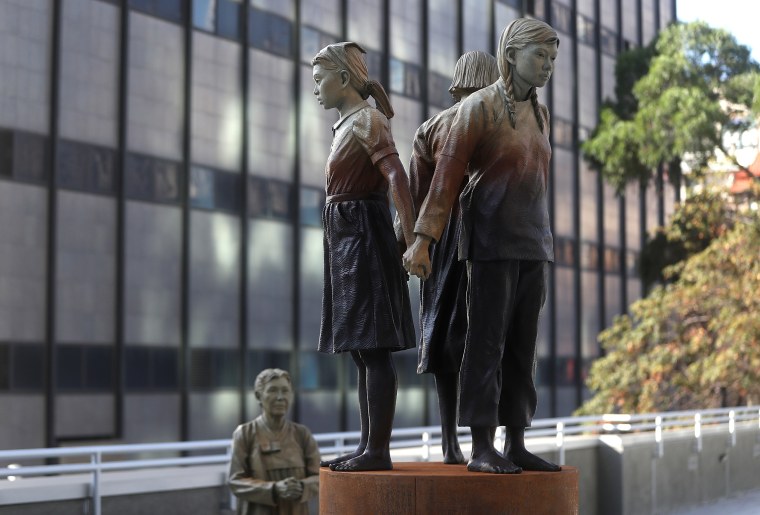Two California non-profits are planning to distribute across school districts in California a teacher's resource guide about “comfort women,” the mostly Korean women who were forced into Japanese military-run brothels during World War II.
The guide was commissioned by the Korean American Forum of California (KAFC) and the Comfort Women Justice Coalition (CWJC), which spearheaded the creation and installation of a comfort women memorial in San Francisco in 2017, as part of their efforts to educate the world about this chapter of World War II history in Asia.
“We need to do that in order to make sure that this kind of history will never be repeated again,” Lilian Sing, a retired San Francisco judge and co-chair of the CWJC, said. “And hopefully the historical atrocities like ours, like comfort women, as well as American slavery, the Armenian Genocide and the Holocaust, will never happen again.”
During World War II, an estimated 200,000 women from countries including Korea, the Philippines, China, and Indonesia were forced into sexual slavery and “served” between five to 60 soldiers per day, according to research referenced by professors from Vassar College and Shanghai Normal University.
The guide contains primary documents about Japan's comfort women system, information about comfort women memorials in the United States, brief lesson plans with discussion questions and group exercises, comfort women testimonies, and the text of a congressional resolution asking the Japanese government to acknowledge, apologize for, and accept responsibility for its comfort women system.
The debate around discussion of comfort women has been a controversial issue. Advocates of discussion say that the Japanese government has long denied justice to comfort women, while opponents say there is no evidence supporting the claim that women were forced into sex slavery and that Japan has already apologized for its actions.
Despite the controversy, California's State Board of Education in 2016 approved a history-social science framework for California Public Schools that includes comfort women in the 10th grade world history curriculum. The year before, the San Francisco Board of Education approved a resolution to teach staff and students about human trafficking, including the history of comfort women.
After California approved the new framework, the KAFC and CWJC commissioned lesson plans for teachers to use in their classes and printed 1,000 hard copies of the material, according to Phyllis Kim, executive director of KAFC. The lesson plans, written by three scholars and reviewed by two veteran educators, is also available on a website dedicated to comfort women education that KAFC launched in September.
Kim said that the KAFC and CWJC plan to pitch the book to every school district in California, but will also provide any educator regardless of geographic location with materials as long as they're able to to teach in English. She added that she's had requests for material from as far as Germany.
Last month, the KAFC and CWJC provided copies to at least 20 Southern California teachers who attended a comfort women workshop for high school history teachers, Kim said.
One school district that will take the material into consideration is the Glendale Unified School District, which is slated to review it in February to see if it meets the requirements of the new history-social science framework. The district will begin the process of adopting new instructional materials for social science in two years, which will include information on comfort women, Kristine Nam, communications director at the Glendale Unified School District, said in an email.
Follow NBC Asian America on Facebook, Twitter, Instagram and Tumblr.

